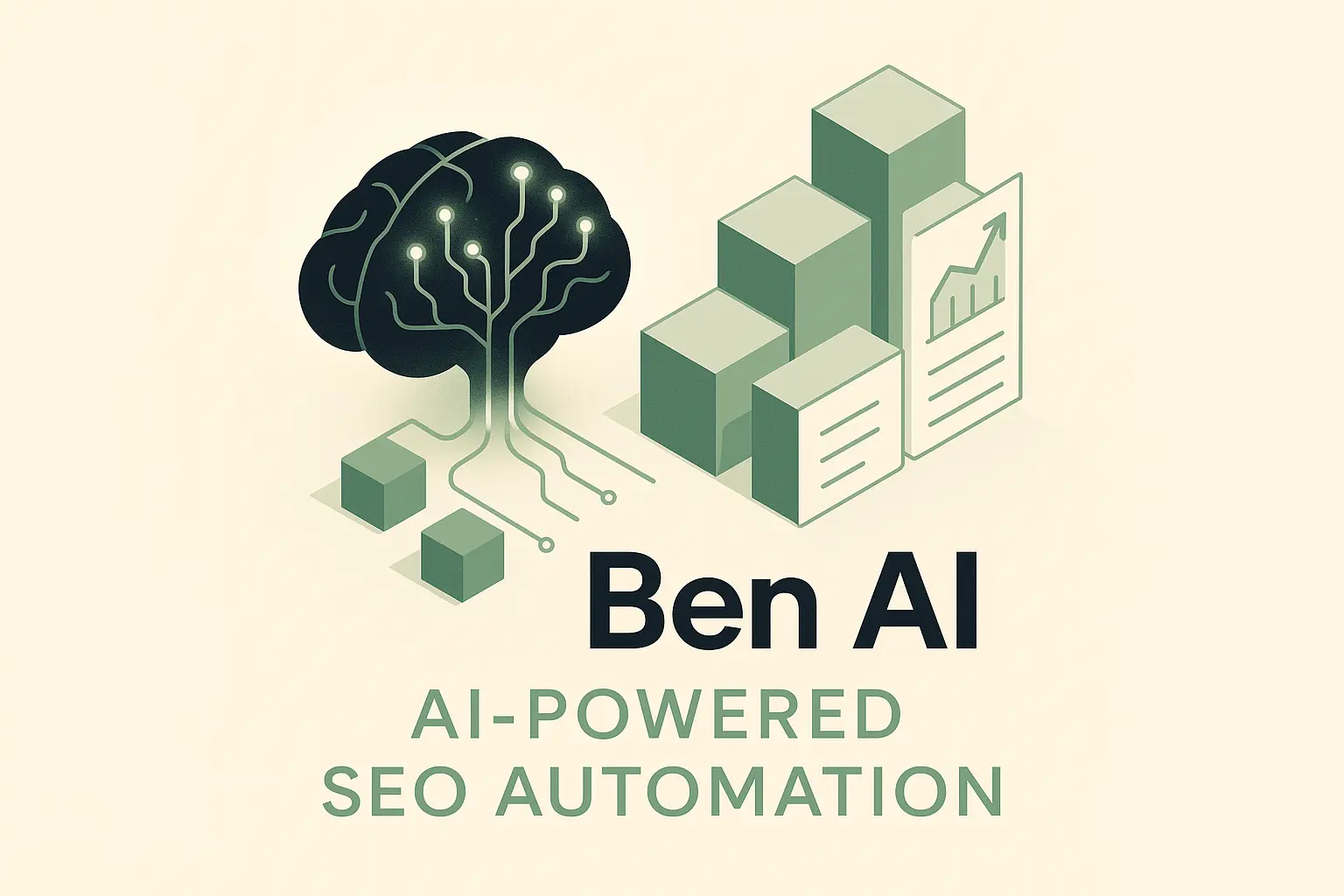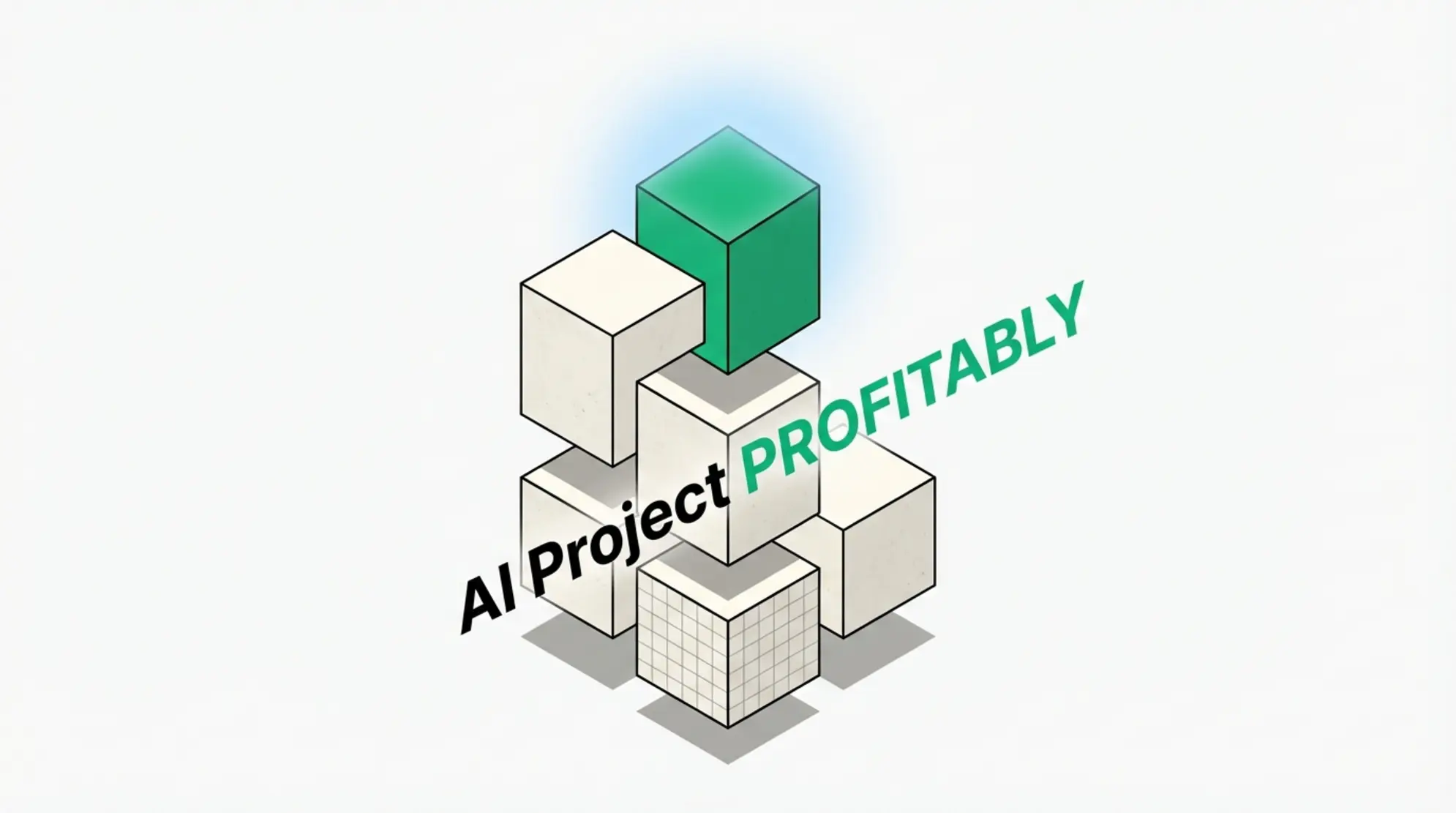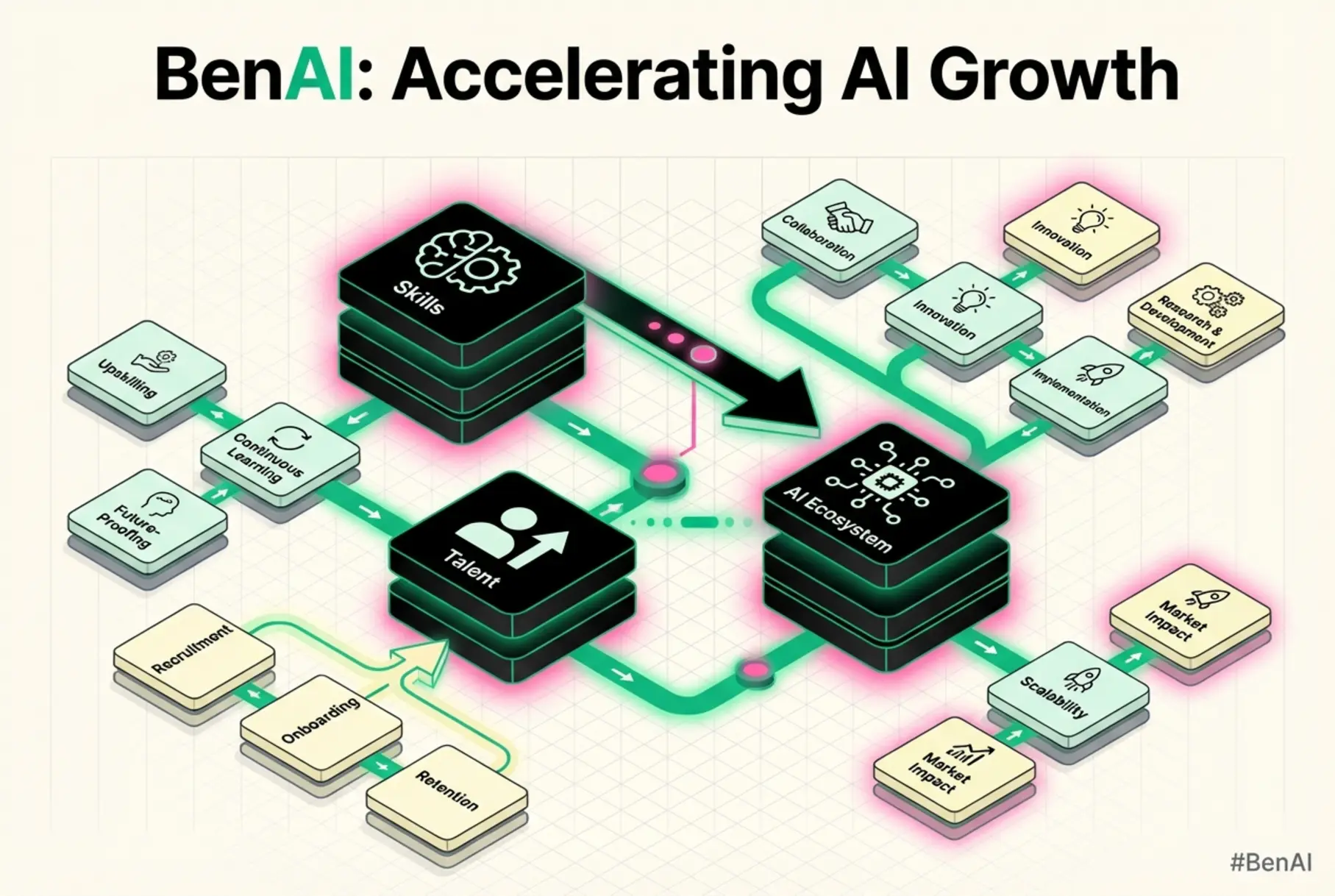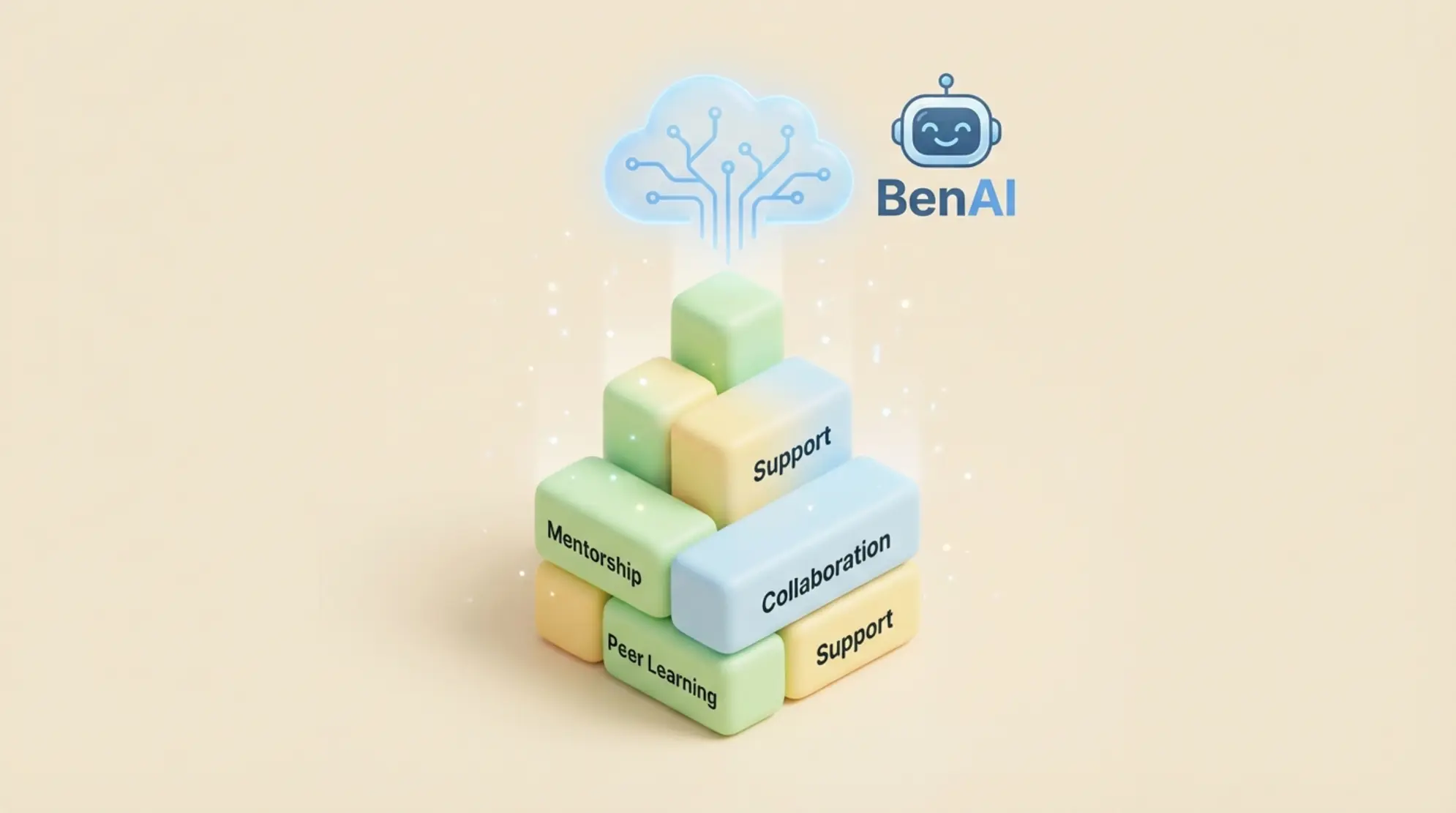The digital landscape is undergoing a profound transformation driven by artificial intelligence, creating an undeniable imperative for businesses to adopt AI-powered SEO automation systems. Manual SEO processes, burdened by repetition and vast data demands, are unsustainable for achieving scalable digital growth and maintaining a competitive edge in today's dynamic market. AI-powered solutions offer a strategic pathway to overcome these limitations, significantly enhancing efficiency and scalability across all digital strategies. This guide provides decision-makers and marketers with a comprehensive understanding of AI's transformative role, highlighting the value proposition of integrating advanced automation into their SEO frameworks. A strategic understanding of Answer Engine Optimization (AEO) and Generative Engine Optimization (GEO) is crucial for future-proofing visibility. According to SEO.com, the global AI SEO software tool market is projected to reach $4.97 billion by 2033, demonstrating a significant expansion from $1.99 billion in 2024, signaling a critical market shift towards automated intelligence in SEO.
What is AI-Powered SEO Automation?
AI-powered SEO automation refers to the application of artificial intelligence technologies, including Machine Learning (ML) and Natural Language Processing (NLP), to autonomously perform, optimize, and scale various search engine optimization tasks. This advanced approach leverages predictive analytics and sophisticated algorithms to analyze vast datasets, identify complex patterns, and execute data-driven actions with minimal human intervention. It enables businesses to streamline everything from keyword research and content creation to technical audits and performance tracking, going beyond the capabilities of traditional manual or rule-based systems. This transformation is underscored by substantial market growth; according to SEO.com, the global AI SEO software tool market is projected to reach $4.97 billion by 2033, expanding significantly from $1.99 billion in 2024. Furthermore, SEOMATOR reports that the broader AI-powered SEO sector hit $67 billion in 2025, demonstrating a robust 22% annual growth rate.
Traditional vs. AI-Powered SEO Automation: A Comparative Overview
Understanding the fundamental differences between traditional and AI-powered SEO automation is crucial for evaluating their impact on modern digital strategies. Traditional methods often rely on predefined rules and manual analysis, while AI-powered systems utilize continuous learning and sophisticated pattern recognition to adapt and optimize dynamically.
Why AI-Powered SEO Automation is Essential for Modern Businesses
In today's rapidly evolving digital ecosystem, embracing AI-powered SEO automation is no longer optional; it is a strategic imperative for businesses seeking to maintain relevance, efficiency, and a significant competitive edge. The relentless pace of algorithm updates, the explosion of online content, and the rising complexity of user behavior necessitate intelligent, scalable solutions that transcend manual capabilities.
1. Efficiency Gains
AI automates repetitive and time-consuming SEO tasks, freeing human specialists to focus on high-level strategy and creativity. According to the AI SEO Benchmark Report, AI automates 44.1% of key SEO tasks, leading to substantial time savings for professionals. Specifically, 15.6% of professionals save over 10 hours per week, and 39% save between 1 and 5 hours per week. This automation extends across areas such as keyword research, content drafting, and technical audits, transforming operational workflows.
2. Scalability
AI systems handle vast datasets and scale operations beyond human capacity, enabling businesses to manage extensive websites, analyze millions of keywords, and monitor countless backlinks simultaneously. This capability is critical for large enterprises or rapidly expanding businesses that require continuous, comprehensive optimization across diverse content portfolios without a proportional increase in human resources.
3. Enhanced Insights
AI provides deeper understanding of user intent and market trends through advanced data analysis, identifying subtle patterns and latent semantic relationships that manual analysis often overlooks. This leads to more precise targeting, improved content relevance, and a proactive approach to evolving search behaviors. Such insights empower businesses to make data-driven decisions that directly impact their organic visibility and engagement.
4. Algorithm Adaptability
AI highlights its ability to adapt to continuous algorithm changes, constantly learning from new data and adjusting strategies in real-time. This ensures that SEO efforts remain effective and compliant with the latest search engine guidelines, offering resilience against sudden shifts in ranking factors. The proactive nature of AI helps businesses maintain their rankings and traffic even as search landscapes evolve.
5. Competitive Advantage
AI enables businesses to outpace rivals by delivering superior SEO performance and efficiency. According to SEOPROFY, 65% of businesses report better SEO results with AI, with some seeing a 30% improvement in rankings within 6 months. Furthermore, SEOMATOR reports that e-commerce businesses leveraging AI for SEO-driven content have experienced up to a 45% increase in organic traffic and 38% higher conversion rates. This translates into increased market share, improved brand visibility, and a stronger return on investment.
Core Functions of AI-Powered SEO Automation Systems
AI-powered SEO automation systems revolutionize traditional workflows by integrating artificial intelligence into critical SEO functions, transforming how businesses approach digital visibility and performance. These systems extend capabilities beyond human limitations, offering unprecedented precision, scale, and insight.
1. Automated Keyword Research & Clustering
AI goes beyond simple search volume analysis to understand complex user intent, semantic relationships, and discover long-tail opportunities that manual methods often miss. Leveraging Natural Language Processing (NLP) and machine learning, AI tools can identify nuanced variations in queries, cluster keywords based on topical relevance, and predict emerging trends. This ensures keyword strategies are comprehensive, semantically rich, and aligned with diverse user journeys.
2. AI-Driven Content Creation & Optimization
AI's role in content extends from generating outlines to drafting entire articles, optimizing for topical authority, readability, and semantic relevance. AI tools can analyze top-ranking content, identify content gaps, and suggest improvements to structure, tone, and entity coverage. While AI significantly accelerates content production—with SEOMATOR reporting that 13.08% of top-performing Google content is now AI-generated—DigitalOft emphasizes that 93% of marketers edit AI-generated content before publishing, stressing the necessity of human oversight for quality and accuracy. This ensures content maintains a unique brand voice and adheres to E-E-A-T principles.
3. Technical SEO Audits & Prioritization
AI leverages sophisticated algorithms to identify and prioritize technical issues at scale, predicting their potential impact on search performance and monitoring critical metrics like Core Web Vitals. These systems can proactively detect broken links, crawl errors, duplicate content, and indexing problems across vast websites, offering actionable recommendations for resolution. This preemptive approach minimizes technical debt and maintains optimal site health.
4. Intelligent Link Building & Backlink Analysis
AI assists in identifying high-quality link opportunities, assessing domain authority, and automating personalized outreach. By analyzing competitor backlink profiles, contextual relevance, and link velocity, AI algorithms pinpoint valuable prospects that align with specific content themes and target audiences. This automates the time-intensive process of link prospecting and improves the effectiveness of link acquisition strategies.
5. Advanced Performance Tracking & Reporting
AI's capabilities provide real-time insights, anomaly detection, competitive monitoring, and predictive analytics that surpass traditional reporting. These systems continuously track rankings, traffic, conversions, and user engagement metrics, alerting teams to sudden shifts or opportunities. Predictive models forecast future performance based on current trends and algorithm signals, allowing for proactive adjustments to SEO strategies.
The New Frontier: Answer Engine Optimization (AEO) & Generative Engine Optimization (GEO)
The advent of generative artificial intelligence has ushered in a new frontier for SEO, demanding specialized approaches to optimize for evolving search results: Answer Engine Optimization (AEO) and Generative Engine Optimization (GEO). These paradigms recognize that users increasingly receive direct answers or summaries from AI, rather than navigating directly to websites, fundamentally altering the search engine results page (SERP) landscape. According to SEO.com, AI Overviews now appear in 47% of Google search results, with 58% of informational queries triggering them. DigitalOft reports that this shift has reduced organic web traffic by 15% to 25% for some traditional results. Despite this, 49% of users still click traditional blue links after seeing an AI-generated answer, though Position #1 results see a 34.5% lower CTR when AI Overviews are present. This underscores the importance of optimizing for both direct AI visibility and strong organic positioning.
Answer Engine Optimization (AEO)
AEO focuses on optimizing content to be directly cited or summarized by AI Overviews, chatbots, and other generative search experiences. The goal is to provide concise, authoritative answers that AI can easily extract and present to users.
Strategies for AEO:
- Concise, direct answers: Structure content with clear, succinct responses to common questions, often in an FAQ format or as prominent summary paragraphs.
- Structured data (FAQ, How-To schema): Implement appropriate schema markup to explicitly tell search engines and AI models the nature and context of your content, making it easier for them to parse and present.
- Entity relationships: Clearly define and link entities within your content, helping AI understand the connections between concepts and improving contextual relevance.
- Clear Q&A formats: Utilize headings and subheadings to pose questions directly, followed by immediate, factual answers.
Generative Engine Optimization (GEO)
GEO involves crafting content to be discoverable and preferred by generative AI platforms (such as ChatGPT or Perplexity) for summarization and recommendations. This approach aims to establish content as a trusted source for LLMs, increasing the likelihood of it being referenced in AI-generated responses.
Strategies for GEO:
- Comprehensive topical authority: Develop in-depth content that covers a subject exhaustively, addressing all related subtopics and demonstrating deep expertise.
- Structured, semantically rich content: Organize information logically with clear hierarchies, using semantic HTML tags and diverse vocabulary to enhance AI's understanding of the content's meaning and context.
- Clear contextual bridges: Create strong internal links and use transition phrases that logically connect ideas, guiding both human readers and AI models through complex information.
- Focus on Expertise, Experience, Authoritativeness, and Trustworthiness (E-E-A-T): Build content that clearly demonstrates E-E-A-T through expert authorship, credible sources, factual accuracy, and transparent methodologies, which LLMs increasingly value when selecting information to present.
Choosing and Implementing Your AI SEO Automation System
Successfully integrating an AI-powered SEO automation system into your workflow requires a strategic, phased approach, ensuring alignment with business objectives and optimal resource utilization. A structured implementation minimizes disruption and maximizes the transformative benefits of AI.
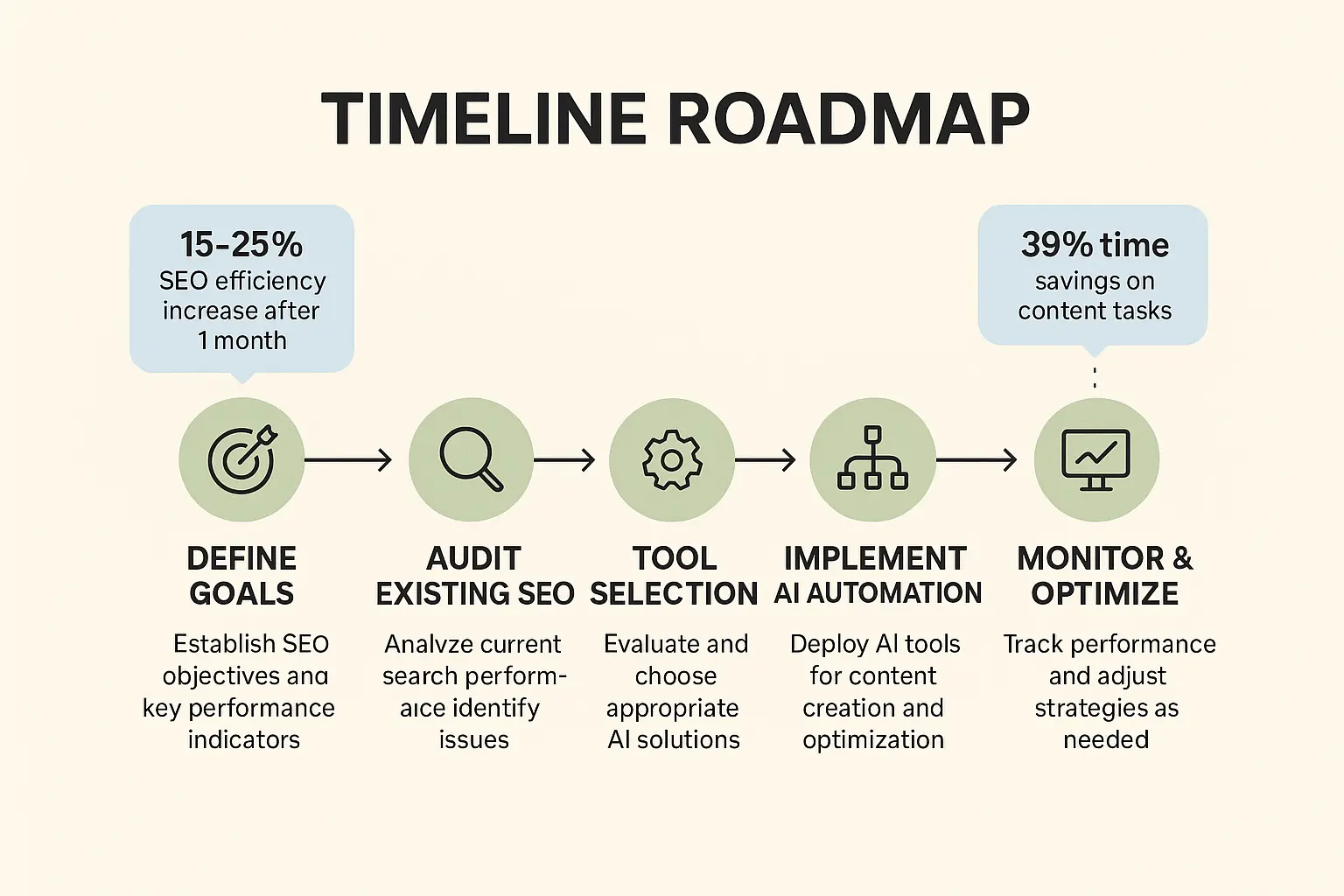
Implementation Steps
- Define Goals: Clearly establish specific, measurable, achievable, relevant, and time-bound (SMART) objectives for AI SEO. These goals could include improving organic rankings for specific keywords, increasing organic traffic by a certain percentage, or reducing manual task hours.
- Audit Existing SEO: Conduct a thorough audit of current SEO processes, identifying pain points, inefficiencies, and areas where AI can deliver the most immediate impact. This assessment helps prioritize AI integration efforts.
- Select Tools: Research and evaluate AI SEO tools based on defined criteria and specific business needs. This involves comparing features, pricing, integration capabilities, and vendor support.
- Integrate: Implement the chosen AI system, starting with a pilot program or phased rollout to test its effectiveness and ensure seamless integration with existing marketing and content workflows.
- Monitor & Refine: Continuously monitor the system's performance against set goals, gathering feedback and making iterative refinements. AI systems are designed for continuous learning, so ongoing optimization is essential.
Key Criteria for Selecting Tools
For businesses, selecting AI SEO tools often hinges on balancing various factors to maximize ROI without overwhelming resources. Effective tool evaluation addresses the competitive gap for nuanced tool comparison.
- Budget: Determine a realistic budget, considering both initial investment and ongoing subscription costs.
- Integration Capabilities: Assess how well the tool integrates with existing tech stacks, including content management systems (CMS), analytics platforms, and other marketing tools.
- Team Skill Level: Evaluate the expertise of your team to operate the tool effectively, considering training requirements and ease of use.
- Specific SEO Needs: Identify the core SEO challenges the business aims to solve (e.g., content generation, technical audits, link building) and select a tool with specialized strengths in those areas.
- Vendor Support: Consider the quality of customer support, documentation, and community resources available from the vendor.
Human-AI Collaboration Frameworks
A crucial aspect of successful AI SEO implementation is fostering robust human-AI collaboration, balancing AI efficiency with human creativity, strategic input, and ethical oversight. While AI excels at data processing and automation, human expertise remains indispensable for strategic direction, brand voice, and E-E-A-T compliance. According to SEOPROFY, 86% of SEO professionals have integrated AI into their strategies, highlighting its pervasive adoption. This framework emphasizes human oversight at critical junctures, particularly for content generation, ensuring factual accuracy, unique insights, and alignment with brand values. BenAI solutions actively promote this synergy by providing intuitive interfaces that empower human strategists to guide AI, ensuring outputs are not just optimized, but also creative, resonant, and ethically sound.
Common Pitfalls to Avoid
Implementing AI SEO automation is not without its challenges. Businesses avoid several common pitfalls to ensure long-term success.
- Over-automation: Relying solely on AI without human review can lead to generic content, factual inaccuracies, or outputs that lack a unique brand voice and E-E-A-T.
- Ignoring E-E-A-T: Neglecting the human elements of Expertise, Experience, Authoritativeness, and Trustworthiness in favor of pure automation undermines long-term credibility with both users and search engines.
- Lack of Human Review: Failing to implement robust human oversight for AI-generated content or strategic decisions can result in suboptimal or even detrimental SEO outcomes.
- Chasing Shiny Tools Without Strategy: Adopting AI tools without a clear strategy or understanding of specific business needs can lead to wasted resources and disjointed efforts.
Empowering Your Strategy with BenAI's Solutions
At BenAI, we understand the critical need for advanced, intelligent SEO solutions in today's dynamic digital landscape, offering a suite of AI-powered automation systems designed to revolutionize your approach to organic search. Our platforms are engineered to directly address the challenges of manual SEO and capitalize on emerging AI-driven opportunities.
From automating sophisticated keyword research and content optimization to delivering real-time performance insights, BenAI’s AI-powered SEO solutions provide the efficiency and scalability businesses require. We ensure your content adheres to the highest E-E-A-T standards, leveraging AI to enhance, not diminish, human expertise. Partner with BenAI to transform your SEO strategy, gain a decisive competitive advantage, and confidently navigate the future of search with unparalleled insights and control.
Frequently Asked Questions (FAQs)
How does AI automate specific SEO tasks like keyword research and content optimization?
AI automates keyword research by leveraging Natural Language Processing (NLP) and machine learning to analyze vast datasets, identify latent semantic relationships, and cluster keywords by user intent, far beyond simple search volume. For content optimization, AI can generate outlines, draft sections, and refine content for topical authority, readability, and semantic relevance, ensuring comprehensive coverage and alignment with user queries.
What are the best AI SEO tools for small businesses, considering budget and integration?
For small businesses, selecting AI SEO tools often hinges on balancing budget, ease of integration, and specific feature sets to maximize ROI without overwhelming resources. Key considerations include the tool's ability to offer scalable features that grow with your business, seamless integration with existing platforms, and a user-friendly interface that doesn't require extensive training for smaller teams. Instead of specific recommendations, businesses should evaluate tools that offer robust capabilities in critical areas like content optimization, basic technical audits, and performance tracking without prohibitive costs. BenAI provides tailored AI marketing solutions designed to meet these needs, offering scalable, integrated systems that deliver significant value within constrained budgets.
Can AI replace my SEO specialist, or is human oversight still necessary?
No, AI is designed to augment, not entirely replace, human SEO specialists; it functions as a powerful co-pilot that enhances efficiency and analytical capabilities. AI excels at automating repetitive tasks, processing massive amounts of data, and identifying complex patterns at speeds impossible for humans. However, human expertise remains crucial for strategic thinking, creative content development, ethical judgment, adapting to unforeseen market shifts, and upholding E-E-A-T (Expertise, Experience, Authoritativeness, and Trustworthiness). Our approach to human-AI synergy emphasizes this collaborative model, where AI empowers specialists to elevate their strategic impact and ensures that creativity and critical thinking drive the SEO strategy.
Join Our Growing AI Business Community
Get access to our AI Automations templates, 1:1 Tech support, 1:1 Solution Engineers, Step-by-step breakdowns and a community of forward-thinking business owners.
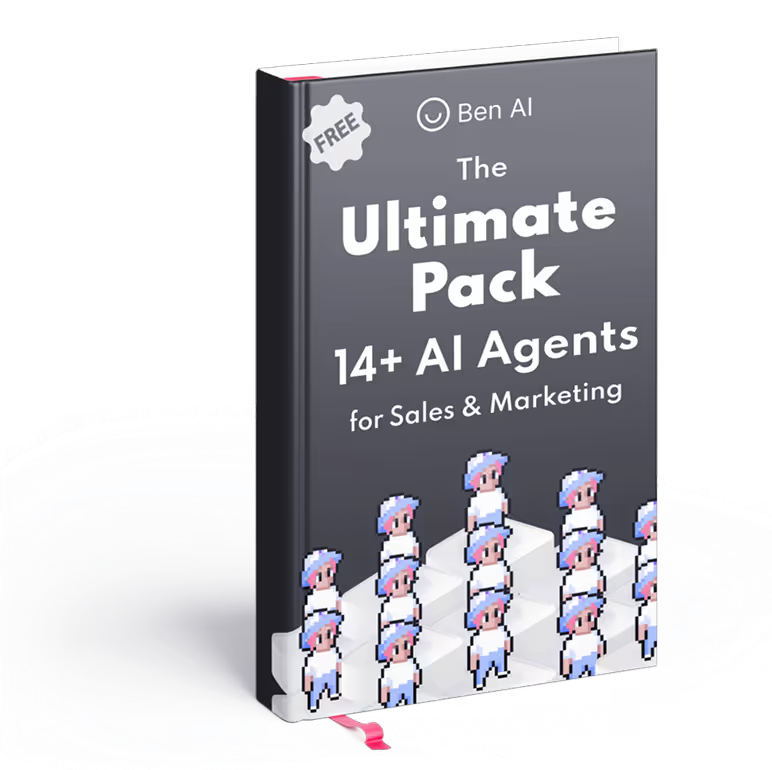
Latest Blogs
Explore our latest blog posts and insights.

